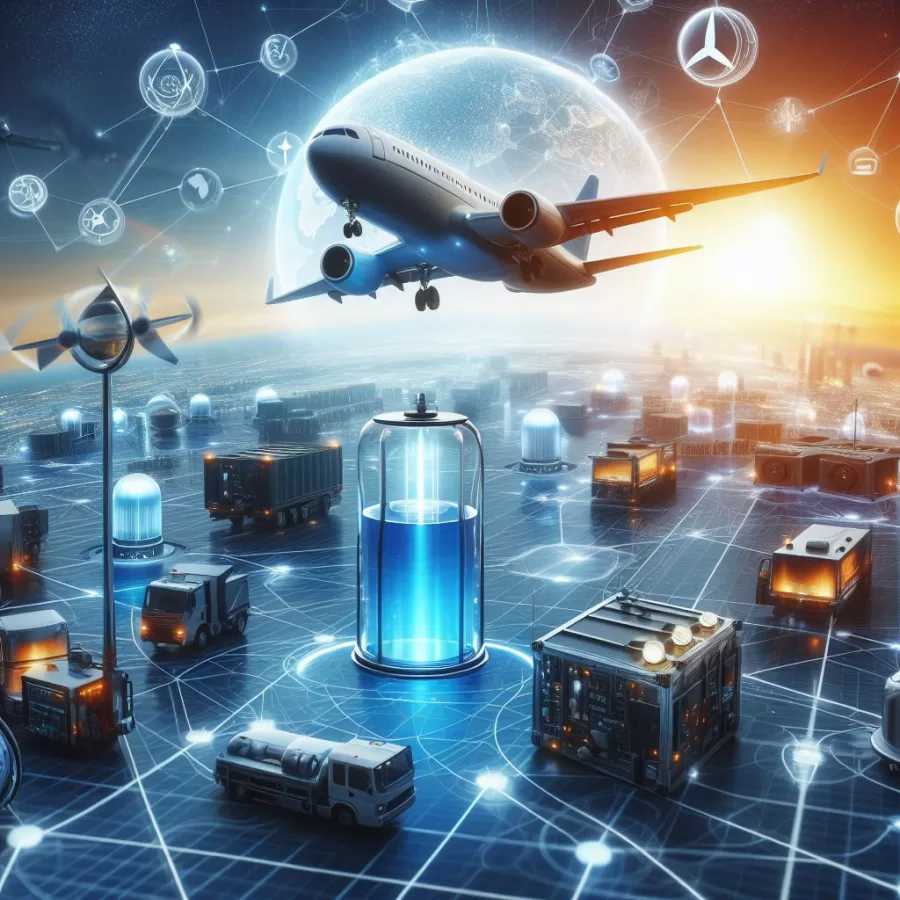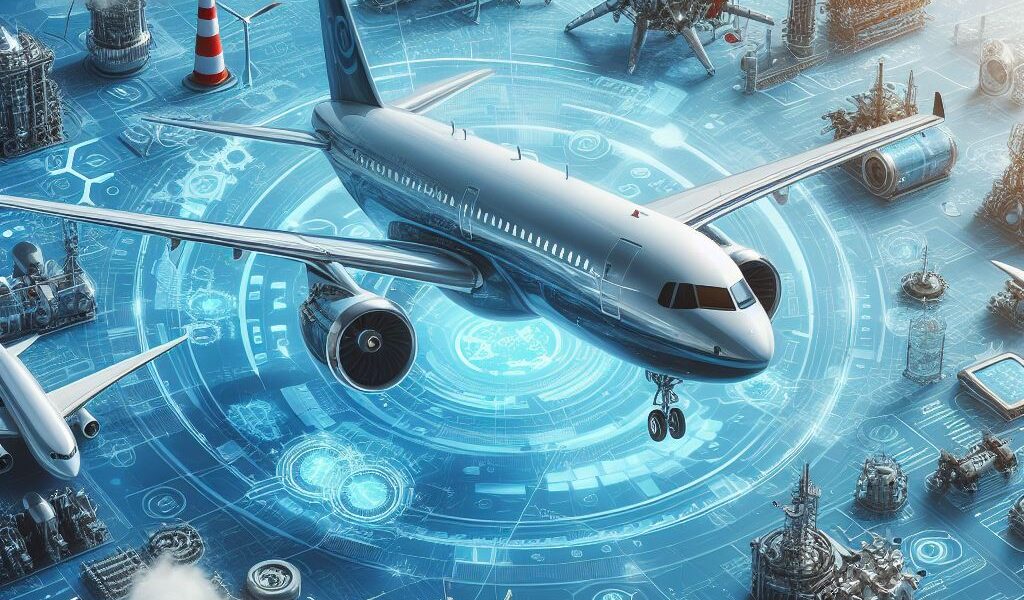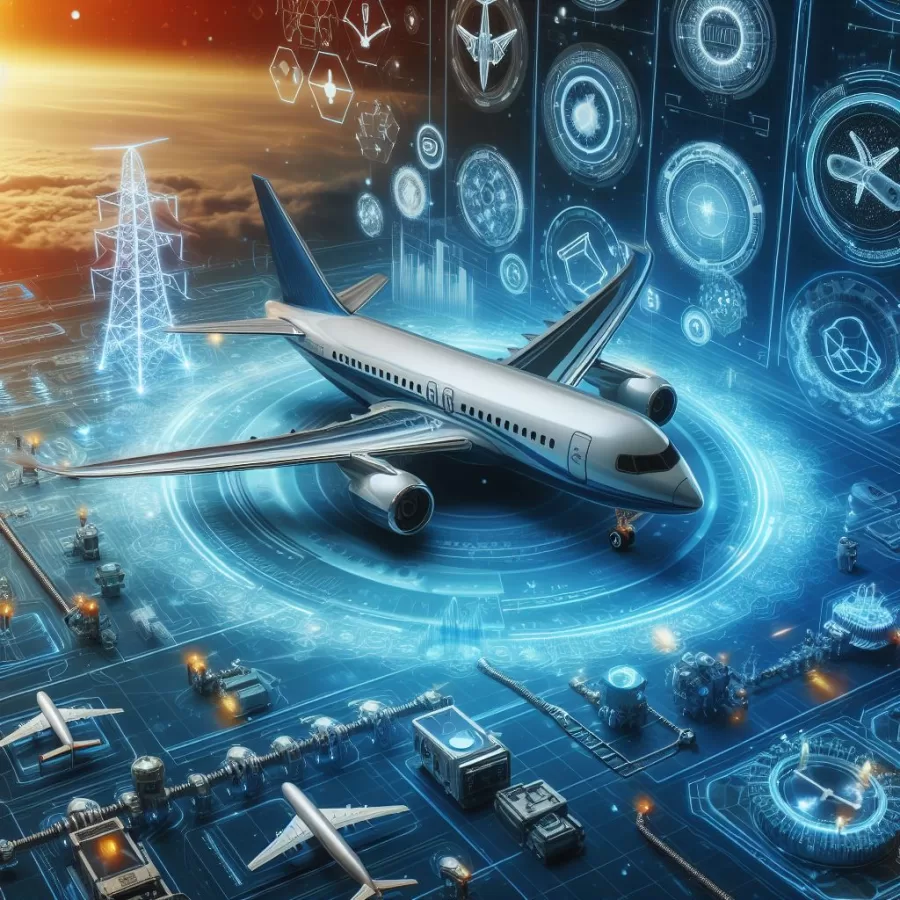Hydrogen fuel cells for aviation are a promising technology that can reduce the environmental impact of flying and increase the efficiency of aircraft
Prof. Aécio D’Silva, Ph.D
AquaUniversity

Hydrogen Fuel Cells for Aviation – Hydrogen fuel cells are devices that convert hydrogen and oxygen into electricity and water, producing zero emissions and high-power density.
The aviation industry is facing increasing pressure to reduce its greenhouse gas emissions and environmental footprint, as well as to improve its fuel efficiency and operational performance. One of the potential solutions that has gained attention in recent years is hydrogen fuel cell technology, which offers a clean and efficient way to power aircraft propulsion systems.
Hydrogen fuel cells are devices that convert hydrogen and oxygen into electricity and water, producing zero emissions and high-power density. Hydrogen can be stored in gaseous or liquid form or produced on board from renewable sources such as solar or wind power. Hydrogen fuel cells can be used to power electric motors, or to supplement conventional jet engines in hybrid-electric architectures.
The benefits of hydrogen fuel cells for aviation
Hydrogen fuel cells can reduce the carbon footprint and noise pollution of aircraft, as well as enhance their performance and range.
Hydrogen fuel cells have several advantages over conventional jet fuel for aviation applications, such as:
- Reduced carbon footprint: Hydrogen fuel cells emit only water vapor and heat, eliminating the carbon dioxide and nitrogen oxide emissions that contribute to global warming and air pollution. According to a study by Roland Berger (1), hydrogen fuel cell aircraft could offer a “true zero” solution for greenhouse gas emissions, as the only output of fuel cells is water vapor, the impact of which can be minimized through careful aircraft operation.
- Reduced noise pollution: Hydrogen fuel cells are quieter than jet engines, as they do not involve combustion or moving parts. This can reduce the noise impact of aircraft on the ground and in the air, improving the quality of life for communities near airports and enhancing the comfort of passengers and crew.
- Enhanced performance and range: Hydrogen fuel cells have a higher energy density than jet fuel, meaning that they can store more energy per unit of mass or volume. This can increase the payload and range of aircraft, as well as reduce the fuel consumption and operating costs. Hydrogen fuel cells also have a higher efficiency than jet engines, as they convert more of the fuel’s energy into useful work, reducing the waste heat and energy losses.
The challenges
Hydrogen fuel cells face technical, economic, and regulatory hurdles that need to be overcome before they can be widely adopted by the aviation industry.
Despite the potential benefits of hydrogen fuel cells, there are also significant challenges that need to be addressed before they can become a viable alternative to jet fuel, such as:
- Technical challenges: Hydrogen fuel cells require complex and reliable systems to store, transport, and distribute hydrogen, as well as to manage the heat and water produced by the fuel cells. Hydrogen is a highly flammable and volatile gas, which poses safety and security risks. Hydrogen fuel cells also have a lower power-to-weight ratio than jet engines, meaning that they are heavier and bulkier for the same amount of power output. This can limit the design and performance of aircraft, especially for large and long-haul flights.
- Economic challenges: Hydrogen fuel cells are currently more expensive than jet fuel, both in terms of capital and operational costs. Hydrogen production, storage, and distribution infrastructure is still underdeveloped and costly, and hydrogen fuel cells have a shorter lifespan and higher maintenance costs than jet engines. The cost of hydrogen fuel cells also depends on the availability and price of hydrogen, which can vary depending on the source and location of production. Hydrogen fuel cells need to achieve economies of scale and technological innovation to become more competitive and affordable for the aviation industry.
- Regulatory challenges: Hydrogen fuel cells are subject to strict and evolving regulations and standards, both at the national and international levels. Hydrogen fuel cells need to comply with the safety and environmental requirements of the aviation authorities, as well as the certification and testing procedures of the aircraft manufacturers and operators. Hydrogen fuel cells also need to coordinate with the existing and emerging policies and incentives for the decarbonization and electrification of the aviation sector, such as carbon taxes, emission trading schemes, and renewable energy targets.
The future
Hydrogen fuel cells are expected to play a key role in the transition to a more sustainable and efficient aviation industry, but they need further research and development, as well as collaboration and support from various stakeholders.
Hydrogen fuel cells are not a new concept for the aviation industry, as they have been used for space exploration programs since the 1960s. However, they have gained renewed interest and momentum in recent years, as the aviation industry seeks to reduce its environmental impact and improve its efficiency. Several aircraft manufacturers, such as Airbus and ZeroAvia, have announced plans and projects to develop and test hydrogen fuel cell aircraft, ranging from small regional planes to large commercial jets. Some of these projects have already achieved successful flights and demonstrations, showing the feasibility and potential of hydrogen fuel cell technology. (2,3,4))

However, hydrogen fuel cells are still in the early stages of development and deployment for aviation applications, and they face many technical, economic, and regulatory challenges that need to be overcome before they can be widely adopted by the aviation industry. Hydrogen fuel cells require further research and development to improve their performance, reliability, safety, and affordability, as well as to optimize their integration and compatibility with different aircraft types and configurations. Hydrogen fuel cells also need collaboration and support from various stakeholders, such as governments, regulators, airlines, airports, fuel suppliers, and customers, to create a favorable and conducive environment for their adoption and diffusion. Hydrogen fuel cells need to align with the vision and strategy of the aviation industry, as well as the expectations and demands of the society, to achieve a successful and sustainable transition to a more environmentally friendly and efficient aviation future.
References
(1) https://www.rolandberger.com/en/Insights/Publications/Hydrogen-A-future-fuel-for-aviation.html
(2) https://www.airbus.com/en/newsroom/news/2020-10-hydrogen-fuel-cells-explainedhttps://www.airbus.com/en/newsroom/press-releases/2022-11-airbus-reveals-hydrogen-powered-zero-emission-engine
(4) https://www.popsci.com/technology/hydrogen-fuel-cell-aircraft-explained/




